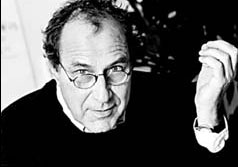Reviews
Books
The Shadow Year

By Jeffrey Ford (Morrow/HarperCollins)
Ford (pictured) travels deep into the wild country that is childhood in this novel - part mystery, part fantasy - about a struggling family on Long Island in the 1960s. The story's "strange changeling year" begins in the last days of August as a prowler is reported outside a neighbor's window. The unnamed narrator, a sixth grader, and his brother, Jim, decide to investigate, enlisting the mysterious powers of their quirky sister, Mary, who tells them what's going to happen by moving the pieces on a model of the neighborhood they keep in the cellar. Jim has built this miniature world, Botch Town, out of "buttons, Dixie cups, ice cream sticks, bottles and assorted other discarded items" on a table their father set up for electric trains - a project nixed by "the money troubles". Ford's attention is always on the kids, keeping their alcoholic mother and workaholic father largely at a distance. But the observations and adventures of these sharp, wayward children provide more than enough depth to be satisfying. And, of course, there's the whodunit: What happened to young Charlie Edison? Who is the prowler? And do the answers to these questions involve the man who cruises the streets in a large white car?
The Executor: A Comedy of Letters
By Michael Kruger (Harcourt)

Rudolf, a famous, curmudgeonly German writer living in Italy, has committed suicide, leaving his longtime friend, the narrator of this taut little novel, to sort out Rudolf's literary legacy and unlock the secret of his last, great masterwork, a novel "meant to transform the genre itself". What a perfect setup for an author with the authority of Michael Kruger (poet, novelist, editor and longtime head of a major German publishing house) (pictured) to ponder writers and writing. This he does through the dead man, who, as remembered by the narrator, had almost nothing good to say about his art or its practitioners: "On the subject of contemporary literature he was excoriating, disparaging it as 'middle-class prose'"; "for him, imagination was a petit-bourgeois fad"; "nothing was more repugnant to him than a gathering of authors". Along the way, Kruger scatters names like bread crumbs - Pavese, Valery, Lucentini, Proust, Kierkegaard, Levi and many more - adding to the rather bombastic tone of the book, translated by John Hargraves. The mystery of the masterwork is provocative, but Rudolf is no Celine - there's not enough genius to make his misanthropy (and misogyny, for that matter) worth caring about.
How Doctors Think

By Jerome Groopman (Mariner/Houghton Mifflin)
These elegant essays by Groopman - a professor of medicine at Harvard and staff writer for The New Yorker - explore the way doctors and patients interact with one another and reveal "what goes on in a doctor's mind as he or she treats a patient". Diagnosis is still an art as much as a science, Groopman argues, and many factors can lead to misdiagnosis. The clinical episodes he describes are both absorbing and affecting. New York Times Syndicate
(China Daily 03/20/2008 page19)














